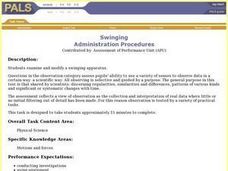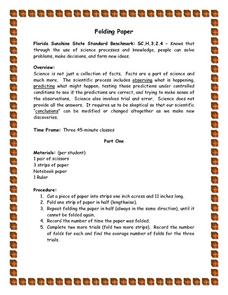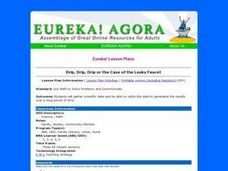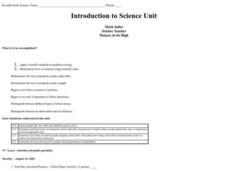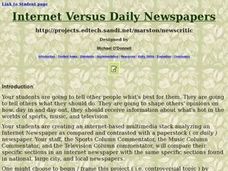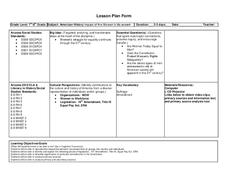Curated OER
Swinging Observations
Students build a pendulum type swinging apparatus and make specific and selective observations using what they know about scientific observations. They look for regularities of movement, patterns, and systemic changes over time.
Curated OER
TSI: Teen Science Investigations
Students read an article about a research conducted on teen brain decision making. In this health science lesson, students identify the steps in the scientific method. They discuss how this research can benefit them when faced with...
Curated OER
Up, Up and Away
Third graders are presented with the problem of: Do all liquids evaporate at the same rate? The lesson contains adequate background information for the teacher. They participate in a lab experiment in order to test the scientific...
Curated OER
Observation and Discovery
Learners explore the basic skills guiding sound scientific invvestigation and methodology. They are introduced to a powerful scientific tool-the microscope. Students review the parts of the microscope. They discuss the inventor of the...
Curated OER
Save Your Change
Learners solve problems involving exponential, logarithmic, and scientific notations. Using calculators, students explore investment problems. They use a formula and logarithms to determine the years to earn a particular income, figure...
Curated OER
Hatching Brine shrimp
Second graders investigate the life cycle using brine shrimp as an example. They conduct observations by watching the shrimp hatch out of cysts. Students design simple experiment to structure an observation. The experiment is approved...
Curated OER
Egyptian Inspiration Web
Students conduct Internet research to discover information about scientific, technological, cultural and intellectual achievements in Egypt, along with Egyptian family life. Students create Inspiration webs of their findings.
Curated OER
Using Science Skills to Investigate Japanese Quail
Sixth graders explore Japanese Quail. They generate and record scientific questions about the quail. Students gather information from various sources and record their data. They compose an inquiry report and include it in a portfolio.
Curated OER
Folding Paper
Students use the scientific process and their knowledge to obeserve, predict, and test their predictions under controlled conditions to verify their predictions and then make sense of these predictions. They also graph, write...
Curated OER
A Living Watershed
Students, through this series of lessons, use local resources, speakers, print and video materials, as well as standard text materials to study the ecosystem of the local watershed.
Curated OER
Farming in a Fishbowl: How Ethnic Groups in
Seventh graders research Chinese agricultural needs and practices. They conduct an experiment with aquaculture and germinated rice as they take measurements and apply the scientific method.
Curated OER
Comparing Notes: a Mathematical Exploration of the Piano
Students examine the history of equal temperament, the modern standard of tuning a piano. Proportion calculations of octaves and perfect fifths are utilized to calculate the frequency of each note in a major scale.
Curated OER
Steller Web Spinning Mystery
Young scholars investigate what a system is in the scientific world. They watch a video of the Stellar seals of Alaska and develop clues as to why the seals are leaving. They discover through the clues they discover, how the components...
Curated OER
With Liberty and Top Soil for All
Middle schoolers describe the need of plants to have water, soil and sunlight to grow. They use the scientific method when completing experiments. They identify the core democratic values that are needed for a democracy to grow and...
Curated OER
I Wonder What An Important Observation Is...
Students discover the importance of descriptions and detail in their writing. They write in their scientific journals and are evaluated by the teacher. They write a descriptive piece and evaluate their own writing as well.
Curated OER
Heroes and Heroines in Science: Dispelling the Stereotype
students think of scientists as heroes and heroines by dispelling the stereotypes of persons in scientific careers. They work in cooperative groups to research the life and works of a scientist and (through the use of the library and the...
Curated OER
Drip, Drip, Drip
Students gather scientific data and be able to utilize the data to generalize results over a long period of time. They use the appropriate tools to measure quanities of liquids and analyze the data to determine the cost of a leaky faucet.
Curated OER
The Energy Debate - Sea Level Rise
Students comprehend the impact of global warming on our coastal cities. They appreciate how geographic information systems can be used to represent scientific data. Students research the melting of the ice caps in Antarctica and the Arctic.
Curated OER
Introduction to Science
Seventh graders investigate scientific methods to solve problems. They demonstrate creating data tables and graphs. They study the role of a scientist and the importance of safety in a science lab. They distinguish between an...
Curated OER
Internet Versus Daily Newspapers
Seventh graders address a series of questions based on Bloom's Taxonomy. Students find a position to be formulated and defended, specifically the Internet newspaper or the traditional daily newspaper. Students create a five card...
Curated OER
How We See: The First Steps of Human Vision
Students notice how various images and colors update constantly as they are affected by factors such as distance, background and lighting. They also examine how optometrists developed a standard to evaluate eyesight.
Curated OER
Violets, Daffodils, Roses and Thorn
Fourth graders complete a variety of exercises and activities surrounding the scientific and artistic properties of the parts and processes of a plant/flower.
Arizona Department of Education
American History Impact of the Women’s Movement
Take a look at important images that depict the women's suffrage movement, the support for the Equal Rights Amendment, and wage equity for women over the last two centuries. As class members work through a lesson on primary source...


